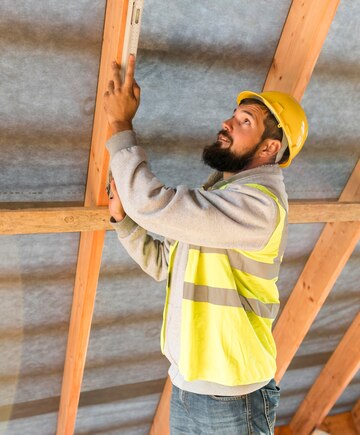How Much Do Insulation Contractors Make?
The income of insulation contractors is an important aspect of the construction industry, reflecting the value of their skilled labor in improving energy efficiency and creating comfortable living and working environments. These professionals are responsible for the installation and maintenance of insulation materials in residential, commercial, and industrial structures. Their compensation can vary widely based on a range of factors, including geographic location, the type and scope of projects they work on, and their level of experience and expertise.
Given the variations in pay, insulation contractors who understand industry trends and pursue additional training may spot opportunities for income growth. Equally, external elements such as the current state of the construction market and changes in building regulations can play a significant role in their earnings. The job of an insulation contractor not only requires physical dexterity but also a knowledge of energy-saving materials and techniques, which can affect their earning potential.
Key Takeaways
- Insulation contractors earn a varied income influenced by regional factors and industry demand.
- Advanced skills and knowledge of efficient materials can lead to higher pay for insulation contractors.
- Market trends and regulations impact the financial opportunities available in the insulation industry.
Understanding the Role of Insulation Contractors
Insulation contractors play a crucial role in energy conservation and comfort within residential and commercial structures. They are responsible for the proper installation of insulation materials, which can significantly affect a building’s energy efficiency.
What Are the Daily Responsibilities?
Insulation contractors’ daily tasks involve measuring and cutting insulation materials, fitting insulation into walls, ceilings, and floors, and ensuring all spaces are adequately sealed. They may work with a variety of materials such as fiberglass, cellulose, or foam. Their work often requires them to operate in confined and sometimes uncomfortable spaces to install or upgrade insulation according to standards.
What Required Skills and Competences Do They Need?
A successful insulation contractor should have a thorough understanding of insulation materials and methods. Skills in reading blueprints and identifying the appropriate insulation for various parts of a structure are essential. Mastery in using tools, including hand knives, power saws, and staple guns, is also critical. Contractors must follow safety practicesrigorously and possess strong problem-solving abilities.
- Key Skills:
- Proficiency in various installation techniques
- Knowledge of different insulation materials
- Attention to detail
- Safety-consciousness
How About Certification and Training?
While on-the-job training is common, some contractors pursue formal education programs or certifications to enhance their qualifications and understanding of industry standards. These might cover building science, energy conservation, and standard concepts of installation. Certification, such as from the Insulation Contractors Association of America (ICAA), can demonstrate a contractor’s commitment to quality and knowledge of best practices.
Industry Overview
The insulation industry is an integral part of the construction sector, interfacing with various industries to enhance comfort and energy-efficiency in buildings.
What Is the Relevance of Insulation Workers in Various Industries?
Insulation workers are crucial for numerous industries, particularly those concerned with construction and infrastructure development. Their role is pivotal in ensuring buildings, whether residential, commercial, or industrial, achieve necessary comfort levels and adhere to energy standards. In 2022, insulation contractors had a median salary reflective of the importance of their work in constructing energy-efficient buildings.
How Does Energy Efficiency Impact Demand for Insulation Workers?
Energy efficiency demands have directly affected the need for skilled insulation workers. As regulations become more stringent and the desire for environmentally friendly and cost-saving construction methods grows, the demand for insulation professionals rises. The construction industry’s focus on energy conservation leads to more jobs for insulation workers, who play a vital role in achieving these goals. Industry growth projections indicate a steady increase in these opportunities, which highlights the importance of the insulation market.
Job Market and Salary Information
In examining the job market and salary information for insulation contractors, it is essential to consider factors such as experience and geographic location, as well as the structure of the compensation.
What Determines an Insulation Contractor’s Salary?
Several factors influence the earnings of insulation contractors. Notably, experience plays a critical role, with more seasoned workers often commanding higher wages. The geographic location can also impact earnings, as market demand and the cost of living vary across different areas. Additionally, certifications and specialized skills may contribute to an increase in an insulation contractor’s salary.
What is the Salary Range and National Averages for Insulation Contractors?
Insulation contractors have a salary range that reflects both experience and location. The lowest pay percentile earns around $38,370, while the median wage for this occupation is $47,980 as of 2022. To contextualize this, the U.S. Bureau of Labor Statistics states the best-paid 25% made $61,510 in the same year. These figures demonstrate a snapshot of the national average for insulation contractors’ pay.
How is an Insulation Contractor’s Compensation Structured?
Compensation for insulation contractors can include a base salary and potential bonuses or profit-sharing. The typical base salary for an Insulation Worker ranges from $38,101 to $57,296. In addition to their base pay, many contractors may receive annual incentives, which can increase their total cash compensation to an average of $47,188. This structure aims to reward experience and productivity in the industry.
Geographical Factors Affecting Income
When considering income for insulation contractors, geographical location is crucial, with factors such as the local cost of living and the economic conditions in various metropolitan areas or states playing a significant role.
Why Does Cost of Living Variations Impact Income?
Cost of living refers to the amount of money needed to cover basic expenses such as housing, food, taxes, and healthcare in different locations. Insulation contractors in areas with a high cost of living, such as New York, often need to charge more for their services to maintain a sustainable income. These variations might mean that:
- Contractors in high cost of living areas could see higher revenues.
- Adjusting for cost of living, actual take-home income could be similar across regions.
How Do Income Differences Between Metropolitan Areas and States Affect Contractors?
The income of insulation contractors varies between metropolitan areas and states due to differing local economies and demand for insulation services. For instance:
- Insulation contractors in bustling metropolitan areas might have a higher volume of work due to the density of buildings requiring insulation services.
- Some states offer incentives or have regulations that can increase the demand for such services, potentially affecting the income one can earn in those areas.
Income data show that contractors in busy urban centers or states with strong construction markets often earn more than those in less active regions.
Advancement Opportunities and Additional Benefits
Insulation contractors may see their career grow significantly with pathways to management roles and access to comprehensive benefits packages that enhance job satisfaction and long-term financial security.
How Can One Move from Insulation Contracting to Management?
An insulation contractor with experience and leadership skills can advance to a manager or supervisor role. This advancement often means overseeing projects, mentoring new contractors, and ensuring adherence to safety and quality standards. A supervisor or manager position also typically translates into higher compensation and may include bonuses for successful project completions.
What Incentives and Benefits Are Available for Insulation Contractors?
Beyond the direct compensation, insulation contractors often receive a suite of benefits. Healthcare coverage is an essential incentive, providing a safety net for medical needs. In terms of retirement, many companies offer 401(k) plans, and sometimes pension plans, helping contractors secure their financial future. These incentives can also include paid time off, professional development opportunities, and other employment perks, making the position not only financially rewarding but also holistically beneficial.
Educational Pathways to Becoming an Insulation Contractor
Entering the insulation contracting field typically requires a blend of education and practical training. Here, we will explore the educational steps potential insulation contractors can take on their career path.
High School Education and Beyond
Is a high school diploma necessary for insulation work? A high school diploma or equivalent is commonly the first educational step for an aspiring insulation contractor. Basic math and science courses provide a solid foundation for understanding construction practices and energy-saving principles. Following high school, individuals often begin gaining experience through entry-level positions where they learn basic insulation techniques and improve their construction skills.
Specialized Training Programs
What type of specialized training should insulation installers consider? Beyond high school, specialized training programs are invaluable for those looking to become insulation contractors. While some insulation workers may learn their trade on the job, others might pursue formal training through apprenticeship programs, which combine classroom instruction with on-the-job training under the guidance of experienced professionals. Additionally, obtaining certifications from recognized bodies can signify a contractor’s expertise and commitment to high-quality workmanship. For example, the U.S. Bureau of Labor Statistics notes that mechanical insulators may complete apprenticeship programs after earning their diploma.
Materials and Techniques
The choice of insulation material and the application techniques used are critical in determining both the effectiveness and the cost-efficiency of insulation in buildings. The materials dictate the durability and performance, while the techniques ensure correct installation and coverage.
What Are the Commonly Used Insulation Materials?
Insulation materials vary in form and application, each with its advantages for particular uses. Fiberglass is a widely utilized material due to its affordability and effectiveness in insulating homes. It comes in both batts and loose-fill formats. Cellulose is another common material, often praised for its eco-friendliness and ease of installation, particularly in retrofit projects. It’s effective for filling irregular voids or covering existing insulation in attic spaces.
For areas requiring moisture resistance or high R-value per inch, spray foam insulation excels in sealing air leaks and insulating challenging spaces, such as air ducts and around pipes. This material expands upon application, creating an airtight seal that enhances energy efficiency. When insulating cold pipes, storage tanks, or cold storage rooms, specialists might opt for materials with specific moisture barrier properties to prevent condensation and ensure the integrity of the structure.
What Are Innovative Installation Techniques?
The application of insulation has seen advancements in techniques that boost efficiency, coverage, and long-term performance. For tight spaces or areas with obstructions, the use of blown-in techniques allows for precise application and reduced waste. This method is especially suited for materials like cellulose and loose-fill fiberglass.
Spray foam technology continues to evolve, providing high levels of thermal insulation and air sealing in one step. Professionals carefully assess the application area to ensure proper thickness and full coverage, taking into account the expansion properties of the foam. This attention to detail ensures maximum energy savings and comfort within the building.
When insulating mechanical systems like air ducts or cold pipes, contractors may employ wraps or pre-formed insulation sleeves that enable a snug fit and prevent heat transfer. For larger areas, such as cold storage rooms, the insulation is often installed in panels which are cut precisely and fitted with attention to thermal bridges to maintain consistent temperature control.
On-the-Job Challenges and Solutions
Insulation contractors face various complexities that can affect their workflow and safety. They must exercise judgmentand creativity to navigate intricate insulation scenarios, while maintaining rigorous safety standards is a critical part of their tasks.
How Do They Handle Complex Insulation Scenarios?
Insulation contractors often encounter irregularly shaped spaces or difficult-to-access areas. They must use their judgment to determine the most effective insulation material and strategy. For example, spray foam might be chosen for tight spaces due to its expansive properties. They also need to balance energy efficiency with budget constraints, requiring creativity in solution-finding. Contractors have a certain degree of latitude in decision-making, which allows them to adapt techniques as needed.
- Solutions:
- Use of advanced equipment like thermal imaging cameras to identify hard-to-see leaks
- Custom-cut insulation for unique shapes, using precision cutting tools
How Do They Maintain Safety Standards?
Safety is paramount for insulation contractors, given the potential exposure to chemicals and working in confined spaces. They must wear appropriate personal protective equipment (PPE) and follow established protocols to prevent accidents.
- Safety Equipment:
- Full-face respirators
- Gloves
- Protective suits
Insulation tasks can be physically demanding, and contractors must be trained in proper lifting techniques and ergonomic practices to avoid injury. Regular safety training refreshers help maintain high safety awareness among the crew.
Professional and Legal Considerations
Before hiring an insulation contractor, it is crucial to recognize the importance of professional licensing and adequate insurance, as well as adherence to established building codes. These factors safeguard both the homeowner and the contractor, ensuring quality work and mitigating risks associated with insulation installation.
Licensing and Insurance Requirements
Are insulation contractors required to have a license and insurance? In the insulation industry, contractors must obtain the necessary licenses to operate legally. These licenses indicate that the contractor has met specific industry standards and is acknowledged by professional bodies such as the Building Performance Institute (BPI). Moreover, having the appropriate insurance protects both the contractor’s crew and the homeowner from potential liabilities. Insurance coverage should typically include general liability and workers’ compensation.
Compliance with Building Codes
How do insulation contractors ensure compliance with building codes? To guarantee building performance and occupant safety, insulation contractors must comply with local and national building codes. These codes cover a range of criteria, including the correct installation of insulation materials and energy efficiency standards. Contractors demonstrate their compliance through inspections and adherence to industry best practices. Regular training and certification can help insulation contractors stay current on code requirements and technological advancements in the field.
Future Outlook for Insulation Contractors
In the coming years, insulation contractors are expected to see a steady job market, with new trends potentially influencing growth rates. This section will explore their projected job outlook and discuss the trends that may shape the demand for their services.
Projected Growth and Emerging Trends
What is the projected job growth for insulation contractors?
The employment of insulation workers is expected to grow by about 2 percent from 2022 to 2032. This growth rate is generally in line with the average for all occupations, indicating a stable market for insulation contractors. There is an anticipation of approximately 4,800 job openings for insulation workers each year over the decade.
What market demand trends are affecting insulation contractors?
Market demand for insulation contractors is closely tied to construction activities, energy regulations, and the emphasis on energy efficiency. As the construction industry continues to incorporate green building practices, insulation installers will likely benefit from an increased demand for their services to improve energy conservation in buildings.
Who typically employs insulation contractors?
The majority of insulation contractors are employed by drywall and insulation contractors, with a significant 66% working in this sector. Other typical employers include building equipment contractors and self-employed workers who offer their services independently.
How are insulation installers adapting to the industry trends?
Insulation installers are adapting by staying current with emerging materials and techniques that contribute to energy efficiency and sustainability. As the industry evolves, those who upskill and embrace innovation may find enhanced opportunities in the market.
Real-World Earnings and Job Scenarios
In this section, we examine case studies of insulation contractors and analyze how factors like experience and location influence earnings.
How Do Specific Case Studies Reflect Insulation Contractor Earnings?
Insulation contractors’ earnings can vary widely based on different factors, such as the complexity of the job or the materials used. For example, a case study highlighted by U.S. News & World Report shows that insulation contractors had a median salary of $47,980 in 2022, with the potential to earn upwards of $61,510.
How Do Experience and Location Affect Earnings for Insulation Installers?
Experience:
- Entry-level: Earnings typically start on the lower end, with PayScale estimating an average hourly rate of $18.16 in 2024.
- Seasoned professionals: Those with advanced certifications and years of experience can command higher rates, sometimes exceeding the national average.
Location:
- High-cost areas: Installers in metropolitan regions or areas with higher living costs often earn more to compensate for the elevated expenses.
- Rural locations: Conversely, salaries might be lower due to less demand or lower operation costs for contractors.
Earnings are tied closely to the local demand for services and the cost of living in a given area, making location a key factor in an insulation contractor’s salary. Moreover, individual salaries can also be influenced by the level of education, attainment of certifications, and additional skills.
Self-Employment Path
The self-employment path for insulation contractors allows for a level of independence and the potential for higher earnings. However, it requires a solid business plan, industry knowledge, and a commitment to developing a solid client base.
What Does Starting an Insulation Business Involve?
To start an insulation business, an individual must first ensure they possess the necessary skills and certifications to work as an insulation contractor. This involves understanding building codes, insulation materials, and energy-saving techniques. Initial steps include creating a business plan, registering the business, acquiring insurance, and securing any required licenses. It is crucial for contractors to invest in quality tools and safety equipment, as these are fundamental to the trade and worker safety. Maintaining relationships with suppliers can also lead to discounts and a reliable supply of materials.
How Can a Contractor Effectively Develop a Client Base?
Developing a client base as a self-employed insulation contractor begins with identifying the target market, which could involve residential homes, commercial buildings, or both. Networking with local builders, architects, and real estate professionals can lead to referrals and partnerships. Additionally, contractors should leverage online marketing strategies such as an SEO-optimized website, social media presence, and online reviews to attract new clients. A focus on customer service excellence can help retain clients and encourage word-of-mouth referrals, which are invaluable for sustained business growth.
Frequently Asked Questions
In this section, we address some of the most common questions regarding the earnings of insulation contractors to provide clarity on their financial prospects in the industry.
What are the average annual earnings for insulation contractors?
The average annual earnings for insulation contractors can vary widely depending on experience, location, and the type of insulation services provided. Data from industry sources suggest that annual salaries typically range from $30,000 to $60,000.
What hourly wage can insulation contractors typically expect?
Insulation contractors typically earn an hourly wage that can range from $15 to $30. This rate fluctuates according to their level of expertise and the geographical demand for insulation services.
Are insulation contractor salaries in Texas higher than the national average?
The salaries of insulation contractors in Texas are generally competitive with national averages but can be influenced by factors like local construction trends and energy efficiency initiatives in the state.
What is the pay difference for insulation contractors working in California compared to other states?
Insulation contractors working in California may notice a difference in pay compared to other states, potentially due to California’s specific building codes and the high demand for energy-efficient buildings.
Can owning an insulation contracting business be financially rewarding?
Owning an insulation contracting business has the potential to be financially rewarding, especially if one successfully navigates the market demand and manages the business with strategic financial planning.
What are the job satisfaction levels among professionals in the insulation industry?
Job satisfaction levels among insulation contractors can be influenced by various aspects, including work environment, compensation, and progression opportunities. Studies and surveys often show that job satisfaction in the trade industry correlates with the ability to deliver skilled craftsmanship and receive fair remuneration.






